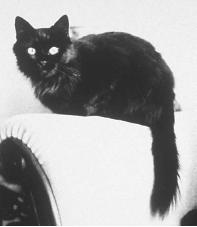Superstitions
Cats
Perhaps no animal has inspired as much superstition as the cat. Throughout history, cats have been worshipped as gods by certain cultures and abhorred as demons by others. In European folklore, the black cat is the traditional companion of witches. Because of this old belief,

An old book called Beware the Cat (1584) gives warning that black cats are witches in disguise, and that killing a cat does not necessarily mean killing the witch, for a witch can take on the body of a cat nine times. In the Middle Ages, the brain of a black cat was considered an essential ingredient in all recipes of the witches and witch doctors.
The old belief that a cat has nine lives goes back to ancient Egypt. The cat-headed goddess, Bast (or Ubasti), was associated with the benevolent aspect of Hathor, the Lioness, and was said to have nine lives. The Egyptians did not fear the cat, but rather reverenced it, and they elevated cats far above the role of domestic pet. To the Egyptians, the cat was transformed from mouse catcher to supreme deity, the "Sayer of Great Words." The Egyptian word for cat was Mau, which is at once an imitation of the animal's call and the nearly universal human cry for mother. Cats came to be worshipped with such intensity that the wanton killing of a cat was punishable by death.
Because the old Egyptians had a great fear of the dark, they observed with awe that the cat, a creature of the night, walked the shadowed streets with confidence. Carefully considering the import of the cat's midnight vigils, the Egyptian sages decided that the cat was solely responsible for preventing the world from falling into eternal darkness.
At the same time, the cat's nocturnal excursions made it a symbol of sexuality and fertility. It seems quite likely that long before Cleopatra worked her magic on Caesar and Antony, the sirens of the Nile used makeup that mimicked the hypnotic eyes and facial markings of the cat.
Bubastis, a city in Lower Egypt, dedicated itself to the worship of the cat. Each May some 700,000 pilgrims journeyed to the city to participate in the festival of the cat.
During the Persian invasion of 529 B.C.E., the Egyptians' deification of the cat proved their undoing. Knowing of the obsession of the Egyptian people with the divinity of felines, Cambyses II, king of the Persians, made a cat part of the standard issue to each of his soldiers. The Nile-dwellers led by King Psamtik III laid down their spears and bows for fear of harming the cat that each enemy soldier carried, and the Persians conquered the city of Pelusium without shedding a drop of blood.
Some people believe that the unwavering stare of the cat can bring about illness or insanity or even cause death. Such an unreasoning, fearful response to cats is known as ailurophobia. Henry III of England (1207–1272) would faint at the sight of a cat. Adolf Hitler (1889–1945) had plans to dominate the world with his Third Reich, but the sight of a cat set him trembling. Napoleon Bonaparte (1769– 1821) arrogantly snatched the crown of the Holy Roman Emperor from the pope and conquered nearly all Europe, but when he spotted a cat in his palace, he shouted for help.
Such dread of cats may be genetically transmitted: when Joseph Bonaparte (1768– 1844), King of Naples, visited Saratoga Springs in 1825, he complained just before he fainted that he sensed a cat's presence. Although his hosts assured His Majesty that no such animal was anywhere present, a persistent search revealed a kitten hiding in a sideboard.
Besides a glance that can bring on terror, folklore also empowers the cat's eyes with the ability to see in the dark. Since all other creatures can see only in the daylight, to see at night reverses the natural order of things and is perceived as sinister and satanic.
Today the cat is not feared as it was in earlier times, and it is now the most popular pet among people in the United States, Australia, and France. However, many superstitious people still regard a cat as an unlucky omen and believe that not only the black cat, but all cats, have nine lives.

Comment about this article, ask questions, or add new information about this topic: